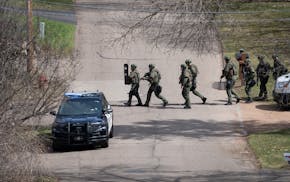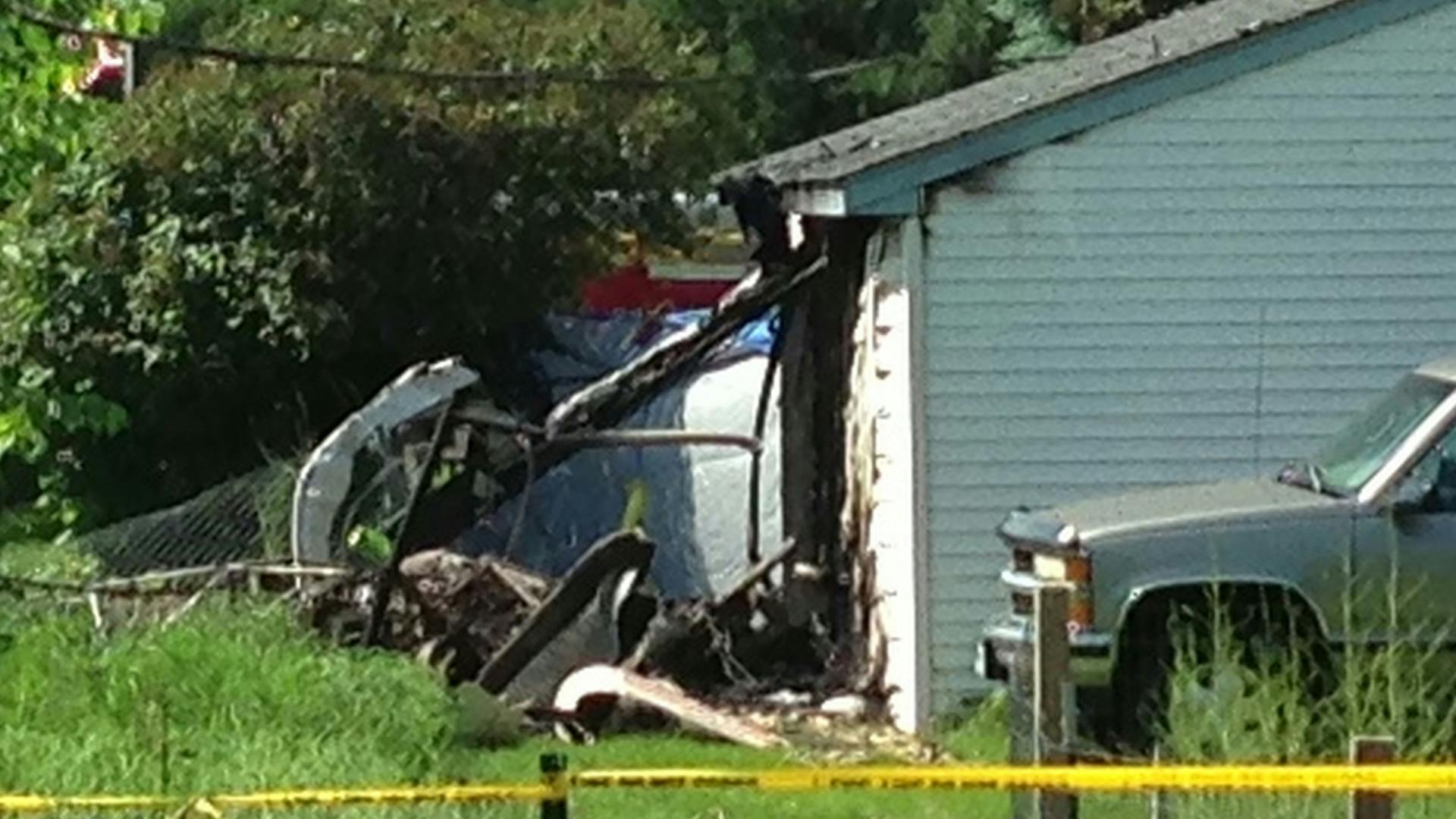A helicopter that crashed into a Maplewood garage on Wednesday morning, killing the pilot, was one of several that frequently swoop low above the Twin Cities trying to control the metro's mosquito population.
Wednesday's crash was the second fatality in the last few decades for Scott's Helicopter Services, which owns the Bell 47 aircraft.
Emergency crews were called to the 2700 block of 7th Street near the Maplewood Nature Center after the helicopter was reported to have crashed into a garage, narrowly avoiding a house, shortly after 8 a.m.
The pilot was identified as Michael Kramer, 44, of St. Charles, Minn. He learned to fly helicopters at a Florida school about 10 years ago and was a full-time helicopter pilot, said his father, Eddie Kramer.
"He was very good and very careful and very calm under pressure," said Eddie Kramer, who also had a pilot's license for about 30 years. "Something went terribly wrong or he wouldn't have come down on a nice day like this, I'm sure of that."
The National Transportation Safety Board (NTSB), which is investigating, said a final report on the cause of the crash will take six months to a year to be completed, although a preliminary report is expected within five days.
Stephen Manweiler, operations director for the Metropolitan Mosquito Control District, said the pilot of the chartered helicopter was on an assignment to spread a natural organism in wetlands to kill larvae of summer floodwater mosquitoes.
Scott's Helicopter Services of Le Sueur, Minn., is the longtime exclusive helicopter contractor for the district.
The flights normally take off from sites around the Twin Cities about 8 a.m. and the helicopters usually drop the treatments from 50 feet, but can drop from as low as 10 or 20 feet, Manweiler said.
"They do fly at lower altitudes. They do fly at lower airspeeds so there are inherent risks with that type of operation," said Aaron Sauer, a senior air safety investigator with the NTSB.
The Metropolitan Mosquito Control District contracts seven helicopters that are used for mosquito control across the Twin Cities where there is emerging vegetation and water, said Jim Stark, executive director of the Mosquito Control District. They generally fly 50 feet in the air on assignments that normally only take 15 to 20 minutes, he said.
Officials from the Federal Aviation Administration (FAA), the State Patrol and Maplewood were at the scene throughout the day.
Tambra Thomas, who lives in a townhouse across the street from the crash site, was just waking up when she heard a loud helicopter that sounded like it was nearby.
"I saw the helicopter going across my window and it was like it was struggling to get up. … As soon as I ran to my window it just kind of turned a little and it just did a nose dive and went down," she said.
Glen Gosselin, 61, who also lives across the street from where the helicopter crashed, said he heard a "whoop, whoop, whoop" and a crash. Seconds later, about 50 feet from the wreckage, all Gosselin could see was black smoke and flames 20 to 30 feet high. When the smoke cleared, he saw the frame of the aircraft sitting just a few feet from the detached garage. A blade from the helicopter was sitting atop the garage. A young couple with a toddler were not home at the time of the crash.
"No way could a guy live through that," Gosselin said. "There's nothing left of it."
Manweiler said he's unaware of any other fatal crash by an aircraft working for the Mosquito Control District. Three other crashes produced only minor injuries to the pilots, who typically fly solo, Manweiler said.
Stark said Scott's Helicopter Services has been working for the district 20 years and "they have a very good safety record."
"We've had some instances where helicopters have had to land in areas where they didn't want to, but it's safe to say there's been nothing as serious as this," Stark said.
A total of 14 accident reports from the NTSB dating back to 1989 show that pilot error was to blame in several crashes involving Scott's Helicopter Services, including two crashes that resulted from inadequate fuel levels.
An NTSB report shows that a pilot was killed on July 24, 2010, when his helicopter crashed while flying at low altitude near Rochester. The report was designated as "preliminary," and did not include any findings associated with completed investigations. The report notes that the pilot was spraying fields at the time.
The last crash preceding Wednesday's accident involved a helicopter spraying a potato field on July 25, 2012 in Akeley, Minn. The pilot was descending over 20-foot-high power lines when he felt a vibration from the rear of the helicopter. The craft crashed in the field, and the pilot suffered minor injuries. The NTSB found the pilot failed to maintain control.
There were no FAA records of accidents or other incidents pertaining to the helicopter that crashed Wednesday.
The owner of Scott's Helicopter Services didn't respond to requests for comment.
Until this past spring, Michael Kramer had been flying a medical helicopter near Knoxville, Tenn., and previously flew tour helicopters over Great Smoky Mountains National Park. He and his wife, Patricia, have a 12-year-old daughter and a 9-year-old son.
The Kramer family has farmed in St. Charles for more than 150 years, and Michael grew up among six sisters and five brothers on a beef farm.
Staff writers Joy Powell, Paul McEnroe, Tony Kennedy, Tim Harlow and Dennis McGrath contributed to this report.
13-year sentence for unlicensed driver who fatally hit motorist while fleeing police in Oakdale

Man killed in Minnetonka by law enforcement started gun battle with deputies, BCA says

FAFSA completions in Minnesota drop amid flawed efforts to update form

Wisconsin Republicans ignore governor's call to spend $125M to combat 'forever chemicals'


